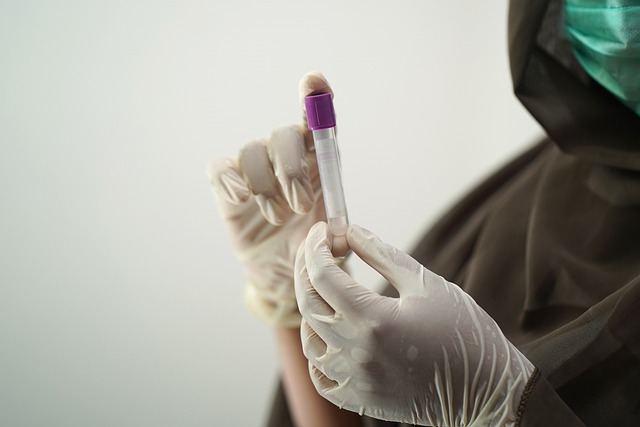The United Kingdom's National Health Service (NHS) advocates for regular kidney blood tests as a key diagnostic tool for monitoring heart health and cholesterol levels. This test provides measurements of total cholesterol, HDL ('good' cholesterol), LDL ('bad' cholesterol), and triglycerides, which are essential indicators of cardiovascular disease risk. For optimal heart health, targets suggest a total cholesterol under 5mmol/L, LDL below 2mmol/L, and HDL above 1mmol/L. Elevated LDL or high triglycerides can indicate an increased risk for heart attacks and strokes, prompting healthcare providers to consider lifestyle modifications or medication. The kidney blood test UK is a non-invasive procedure that can be conducted at NHS clinics or hospitals, or through private services, offering valuable insights into lipid profiles for early intervention and effective cardiovascular disease management. It is a critical component of the UK's preventative healthcare strategy, ensuring individuals receive personalized care to maintain their cardiovascular well-being.
Managing heart health is a priority for many, and understanding cholesterol levels plays a crucial role in this. In the UK, kidney blood tests are pivotal tools for monitoring lipid profiles, offering insight into one’s cardiovascular risk. This article demystifies the process of measuring cholesterol through simple blood tests, tailored for UK residents. We will explore the significance of these tests, how they are conducted, and what your results indicate about your heart health. Whether you’re seeking guidance on interpretation or keen to learn more about kidney blood test UK protocols, this comprehensive guide will equip you with the knowledge necessary to take proactive steps towards maintaining a healthy heart.
- Understanding Cholesterol Levels: The Role of Kidney Blood Test Results in the UK
- How to Measure Cholesterol with Simple Blood Tests: A Guide for UK Residents
- Interpreting Your Kidney Blood Test Results: What Do Your Numbers Mean for Heart Health?
Understanding Cholesterol Levels: The Role of Kidney Blood Test Results in the UK

In the United Kingdom, maintaining optimal cholesterol levels is crucial for cardiovascular health. A key diagnostic tool in this endeavour is the kidney blood test, which provides insights into the balance of lipids within the body. Cholesterol, primarily LDL or ‘bad’ cholesterol, can lead to plaque build-up in the arteries, increasing the risk of heart disease and stroke. The kidney blood test, often referred to as a renal profile or kidney function test, measures various parameters including total cholesterol, HDL or ‘good’ cholesterol, and LDL cholesterol levels. In the UK, the National Health Service (NHS) recommends regular checks for those at higher risk of heart disease, which includes individuals with existing kidney conditions as kidney health can influence cholesterol management. The test results are pivotal in guiding medical professionals to tailor treatment plans, which may involve lifestyle modifications, such as dietary changes and increased physical activity, or pharmacological interventions to control cholesterol levels. Understanding the renal blood test results in the context of overall lipid profiles is essential for early intervention and effective management of cardiovascular risks, underscoring the importance of regular health screenings and proactive health management in the UK population.
How to Measure Cholesterol with Simple Blood Tests: A Guide for UK Residents

For individuals in the UK seeking to monitor their cholesterol levels, understanding how to measure cholesterol through simple blood tests is crucial for maintaining cardiovascular health. A cholesterol test, also known as a lipid profile, can be easily arranged with healthcare providers across the country. This procedure involves drawing a small sample of blood from a vein in your arm, typically at a clinic or hospital. The most common method for measuring cholesterol levels is the kidney blood test, which assesses both total cholesterol and the breakdown of cholesterol into its various components, including LDL (low-density lipoprotein), often referred to as ‘bad’ cholesterol, and HDL (high-density lipoprotein), known as ‘good’ cholesterol.
The National Health Service (NHS) in the UK provides cholesterol testing as part of the preventative healthcare measures. High cholesterol levels can increase the risk of heart disease and stroke, making regular monitoring a key aspect of health management. Upon visiting your general practitioner (GP), you can request a referral for a cholesterol test. Alternatively, some private clinics offer walk-in services for those who prefer quicker access or more flexibility in their scheduling. Regardless of the setting, the procedure remains the same: a healthcare professional will use a needle to extract a sample of blood from your kidney area, which is then sent to a laboratory for analysis. The results typically indicate total cholesterol levels and the ratio of different lipoprotein types, offering valuable insights into your cardiovascular health and guiding any necessary lifestyle or medication adjustments.
Interpreting Your Kidney Blood Test Results: What Do Your Numbers Mean for Heart Health?

In the UK, monitoring cholesterol levels through kidney blood tests is a pivotal aspect of assessing heart health. These tests measure various lipid components, including total cholesterol, high-density lipoprotein (HDL) cholesterol, low-density lipoprotein (LDL) cholesterol, and triglycerides. Interpreting these results is crucial for understanding one’s risk of cardiovascular disease. For instance, a desirable level of total cholesterol should be under 5mmol/L, with LDL cholesterol ideally below 2mmol/L and HDL cholesterol above 1mmol/L. Elevated levels of LDL cholesterol can signify an increased risk for heart attacks and strokes, making it imperative to manage diet and possibly consider medication if lifestyle changes are insufficient. Conversely, high triglyceride levels, typically above 1.7mmol/L, can also contribute to plaque build-up in the arteries and should be managed through a combination of exercise, dietary modifications, and sometimes medications. Regular kidney blood tests in the UK provide a comprehensive picture of lipid profiles, enabling healthcare professionals to tailor advice and treatment plans specific to an individual’s heart health needs. These tests are readily available and often included as part of routine health screenings, making them an accessible tool for proactive health management.
In conclusion, understanding and regularly measuring cholesterol levels through kidney blood tests in the UK is a pivotal step towards maintaining heart health. The process, as outlined in this article, begins with grasping the basics of cholesterol and its components, followed by a straightforward guide on how to undergo and interpret kidney blood test results specific to the UK’s healthcare system. This knowledge empowers individuals to take proactive measures against cardiovascular disease, one of the leading health concerns nationwide. Regular monitoring through simple blood tests can lead to early intervention and lifestyle adjustments that significantly reduce the risk of heart-related issues. For those in the UK seeking to prioritise their cardiovascular well-being, a kidney blood test is an accessible and informative tool to guide your health journey.
